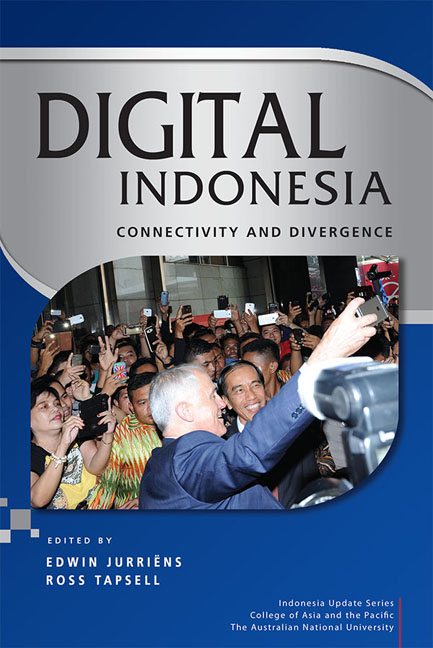Book contents
- Frontmatter
- Contents
- Tables
- Figures
- Contributors
- Acknowledgments
- Glossary
- Map of Indonesia
- 1 Challenges and opportunities of the digital ‘revolution’ in Indonesia
- PART 1 CONNECTIVITY
- 2 An insider's view of e-governance under Jokowi: political promise or technocratic vision?
- 3 Mobile phones: advertising, consumerism and class
- 4 The political economy of digital media
- PART 2 DIVERGENCE
- PART 3 IDENTITY
- PART 4 KNOWLEDGE
- PART 5 COMMERCE
- Index
- Indonesia Update Series
4 - The political economy of digital media
from PART 1 - CONNECTIVITY
Published online by Cambridge University Press: 12 January 2018
- Frontmatter
- Contents
- Tables
- Figures
- Contributors
- Acknowledgments
- Glossary
- Map of Indonesia
- 1 Challenges and opportunities of the digital ‘revolution’ in Indonesia
- PART 1 CONNECTIVITY
- 2 An insider's view of e-governance under Jokowi: political promise or technocratic vision?
- 3 Mobile phones: advertising, consumerism and class
- 4 The political economy of digital media
- PART 2 DIVERGENCE
- PART 3 IDENTITY
- PART 4 KNOWLEDGE
- PART 5 COMMERCE
- Index
- Indonesia Update Series
Summary
It is well known that the business models of the mainstream media industry have been thrown into disarray by the arrival of the internet, which has enabled widespread diversification of media content, mostly delivered for free. In fact, of all industries, digitalisation's impact has affected the media industries first, and most compellingly. Although Indonesia's official internet penetration rates remain low, Indonesians with internet access are living in a time of tremendous choice for online news, informa-tion and entertainment. Individual citizens can also maintain their own participatory media sites, including blogs, Facebook pages and YouTube channels. For the mainstream media companies, digitalisation is bringing enormous challenges, but also significant opportunities. This chapter explains how digitalisation has favoured the larger media companies, whose owners have become wealthier and more politically powerful, and has hindered smaller news sites, some of which are dying out. Despite the fragmentation of media content caused by the internet, digitalisation has enabled further concentration of the mainstream media. Industrial media remains a key avenue by which elites exert power in Indonesia.
In the early days of the internet, many scholars predicted that the ‘new’ online media platforms would replace the ‘old’ or ‘traditional’ media of print, radio and television. Rather, what occurred was that the platforms converged, and the distinct delineation between online and print or television media became largely redundant as old and new media began to ‘collide’ (Jenkins 2006). All major news companies in Indonesia began to acquire digital television and radio stations; online news and social media sites; citizen journalism ventures; and even new daily print publications as newspapers merged and converged.
The mainstream media companies believe that to survive financially in the digital era, they must swiftly morph into multiplatform news services. New digital technologies are allowing for a convergence of social media with print, television, radio, telecommunications, cable television, satellites, gaming, citizen journalism and much more. The previously traditional media companies are now branching out into other digital business ventures such as e-commerce, creating larger digital ‘ecosystems’. This has led many in the media industry and those who study it to rightly ask: ‘What exactly is a media company in the digital age?’ (Economist 2006).
- Type
- Chapter
- Information
- Digital IndonesiaConnectivity and Divergence, pp. 56 - 72Publisher: ISEAS–Yusof Ishak InstitutePrint publication year: 2017



